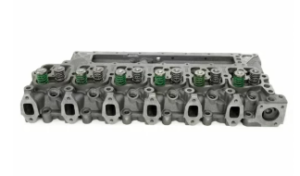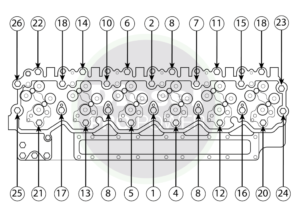March 26, 2025
The Role of the Mechanical Fuel Transfer Pump in Cummins 4BT and 6BT Engines
How the Fuel System Works on the 4BT and 6BT
How the Mechanical Transfer Pump Works
Why the Transfer Pump Is So Important
1. Supplying Fuel Under All Conditions
2. Maintaining Consistent Pressure
3. Protecting the Injection Pump
4. Purging Air
Signs of a Failing Transfer Pump
Maintenance and Care
Keep Fuel Filters Clean
Use Clean Fuel
Inspect for Leaks
Prime Correctly After Service
Replace at the First Signs of Weakness
Installation Tips for the Mechanical Pump
Why Mechanical Pumps Remain Popular
Marine and Industrial Considerations
Selecting a Quality Replacement Pump
Final Thoughts
Read More
March 19, 2025
Cummins Marine Engine Models: Official Names vs. Slang Terms (Including Regional & Application-Specific Nicknames)
1. Cummins B Series Marine Engines (4B, 6B, 6BT, 6BTA)
2. Cummins C Series Marine Engines (6C, 6CT, 6CTA 8.3)
3. Cummins K Series Marine Engines (KTA, KTA19, KTA38, KTA50)
4. Cummins Quantum Series (QSB, QSC, QSM, QSK)
Conclusion
Cummins Engine Parts: Official Names vs. Slang Terms
1. Cylinder Head and Block Components
2. Pistons and Connecting Rods
3. Crankshaft and Camshaft Components
4. Valvetrain and Air Intake Components
5. Fuel System Components
6. Cooling System Components
Conclusion
Read More
February 19, 2025
Cummins Engine Torque Specifications by Model
Cummins 6B, 6BT, and 6BTA 5.9L Torque Specs
Cummins 4BT Torque Specs
Cummins 6C, 6CT, and 6CTA 8.3 Torque Specs
Cummins QSB 6.7L Torque Specs
Cummins QSC 8.3L Torque Specs
Cummins ISC 8.3 Torque Specs
Cummins ISL 8.9L Torque Specs
Cummins ISX Torque Specs
Cummins KTA 19 Torque Specs
Cummins N14 Torque Specs
Cummins 855 Torque Specs
Why Torque Specs Matter
1. Prevents Bolt Over-Tightening
2. Prevents Under-Torquing
3. Ensures Even Clamping Pressure
4. Prevents Fastener Fatigue and Improves Serviceability
5. Improves Performance and Efficiency
Read More
February 14, 2025
Summary of Key Maintenance Tips
1. Regular Oil and Lubrication Maintenance
2. Cooling System Maintenance
3. Fuel System Maintenance
4. Air Intake and Turbocharger Maintenance
5. Exhaust System and Emissions Control
6. Cylinder Head and Valve Adjustment
7. Electrical System Maintenance
8. Preventive Maintenance for Long-Term Engine Health
Final Thoughts on Ensuring Long-Term Engine Reliability
Key Takeaways for Long-Term Reliability:
Looking Ahead: Keeping Your Cummins Engine in Top Shape
Below are two videos of our customer Imperial Diesel Service, rebuilding a Cummins 6BT [ Part 1 & 2]
Read More
February 14, 2025
High-Quality Aftermarket Parts vs. OEM Parts
1. Advantages of High-Quality Aftermarket Parts
2. When to Choose OEM Parts
Choosing the Best Suppliers for Cummins Engine Components
1. How to Identify a High-Quality Aftermarket Supplier
Commonly Replaced Parts and Their Impact on Performance
1. Cylinder Head and Gaskets
2. Pistons, Rings, and Cylinder Liners
3. Fuel System Components (Injectors, Fuel Pump, Lift Pump)
4. Turbocharger and Air Intake System
5. Exhaust System and Emissions Control
6. Cooling System Components (Radiator, Water Pump, Thermostat)
Final Thoughts
Below are two videos of our customer Imperial Diesel Service, rebuilding a Cummins 6BT [ Part 1 & 2]
Read More
February 14, 2025
Best Practices for Storing a Cummins B Series Engine
1. Choose a Suitable Storage Location
2. Clean the Engine Before Storage
3. Drain or Stabilize the Fuel System
4. Change the Engine Oil and Filter
5. Protect the Cooling System
6. Lubricate Critical Engine Components
7. Protect the Battery and Electrical System
8. Seal Openings to Prevent Contamination
9. Rotate the Engine Periodically
Preparing the Engine for Long Periods of Inactivity
1. Create a Storage Checklist
2. Steps for Restarting the Engine After Storage
Final Thoughts
Below are two videos of our customer Imperial Diesel Service, rebuilding a Cummins 6BT [ Part 1 & 2]
Read More
Page 2 of 15«12345...10...»Last »




 Free US Calls: 1-888-433-4735
Free US Calls: 1-888-433-4735 International: 305-545-5588
International: 305-545-5588


